The Fourth Sunday in Lent
John 6:1–15
+ IN NOMINE IESU +
Lent can be a somber time, but let’s not forget the truth: Christ is risen; our Savior is alive. Today we have a respite, albeit short, from the forward trudge to the cross, the slogging it out through temptation. Today, our Lord tells us to sit down and have your fill. For we are journeying toward eternity with Him. We’re not alone. He goes with us. He leads us. He feeds us and give us rest and refreshment along the way.
That is why, in the Small Catechism, we learned that “Confession has two parts. First that we confess our sins, and second that we receive absolution, that is, forgiveness, from the pastor as from God Himself, not doubting, but firmly believing that by it our sins are forgiven before God in heaven” (Luther, Small Catechism, “What is Confession?”). So, yes we repent. We must be sincere, for God searches our hearts. “You shall be holy,” not just do external holy things. So, lenten repentance is done not only with sorrow over our sin and sinfulness but also with confidence that God forgives those who look up to Him. Without Easter confidence, without resurrection faith and hope; downcast faces result.
How many times are we downcast because of sin? Actually, every time we are downcast is due precisely because of sin—ours or others. Let’s say you have some problem that’s getting you down, sometimes to the point of despair. It may be that you didn’t cause that problem; so I’m not saying every time you’re downcast is the direct or indirect result of your own doing. And that’s the result of the fall into sin. When Adam and Eve sinned, the sinful, fallen nature entered into the world and that was passed on from generation to generation, the way eye-color and height and pre-disposition to certain diseases are passed down. It’s part of our spiritual DNA. One bad apple spoiled the whole bushel. A little leaven leavens the whole lump. Or as Paul wrote “One trespass led to the condemnation for all men” (Rom 5:18). So humanity is fallen; creation is defiled, and we live in a broken, sinful world. You may not have directly caused whatever it is that is making you downcast, but our sinful humanity has brought all of it upon us all. We remain part of the problem.
Jesus looked down upon the crowds of those who were downcast and he had compassion on them. He told them to sit down.
When they were on the mountain with Jesus, the disciples doubted. They didn’t know how our Lord would feed so many. They didn’t know how so many could be fed by so little—five barley loaves and two fish. These are the same disciples, remember, who witnessed Jesus turn water into wine. These are the same disciples who saw the blind receive their sight, the deaf their hearing, the crippled and lame their ability to walk. These are the same disciples who had heard His teaching. And yet, even still, they doubted. They had no idea how so little could satisfy so many. They were downcast. They weren’t looking to Jesus, but to themselves. They were downcast.
Nevertheless, our Lord looked down upon the disciples and those who followed Him. He looked down, not in disapproval but with compassion. He told them to sit down. And then He looked up. He took the bread and the fish, and looking up to heaven, He gave thanks and distributed it them all. He gave them bread and fish to eat. They ate their fill, and there was more to go around, filling twelve baskets full of what was leftover. He provided for them more than they needed.
We’re not that different from the disciples. We not only know that Jesus did all those things, but he also was raised from the dead. Good Friday was not the end of the story. Easter came and the tomb was empty, and that is why Good Friday is good. But more than that, we have the witness of our own lives. We all have the perspective in hindsight of how God has been at work in our lives. How one problem after another, which we could not see the answer to, God has worked out for us. And yet do we not still have twinges of doubt when something new arises? Do we not still wonder how something as little as God’s Word will resolve the stickiest of our situations? Do we not in those times look to ourselves and how we can control and manage things instead of calling upon our Lord in prayer and relying upon His promises in His Word? The thing about dealing with sin, even when it’s not our own, is that it has a tendency to weigh us down, make us tired, burn us out. We become downtrodden. We become down in the dumps. We become downcast.
But our Lord looks down in compassion still. And lifting up His eyes toward heaven, he prays that you will have all that you need for this body and life. And you do. None of us here are really lacking in anyway. But beyond that, we have more. We have our fill and there is something leftover. Thus, our Lord, lifting up His eyes, on the night when He was betrayed, took bread and giving it to you, He says: “This is my Body given for you for the forgiveness of sin.” He gives you bread not just to fill up your bellies but to fill up your spirit and revive and renew your souls. So sit down, but lift up your eyes, to see the resurrected and living body and blood of your Savior given for you to eat and to drink for the salvation of your souls. This is the nourishment for the rest of your journey, so that your faces and your eyes would not be downcast, but always lifted up to Him. For He is our goal; that is where we are journeying to. So lift up your faces and cast your eyes upon Him. Be fed and nourished, and follow Him to where He is leading us: to His Father and ours in heaven. Amen.



0 Comments